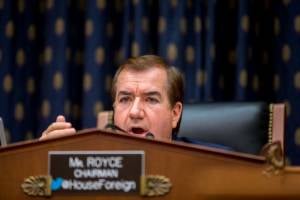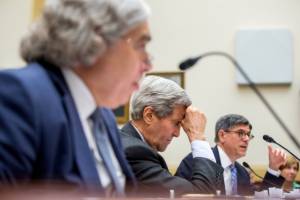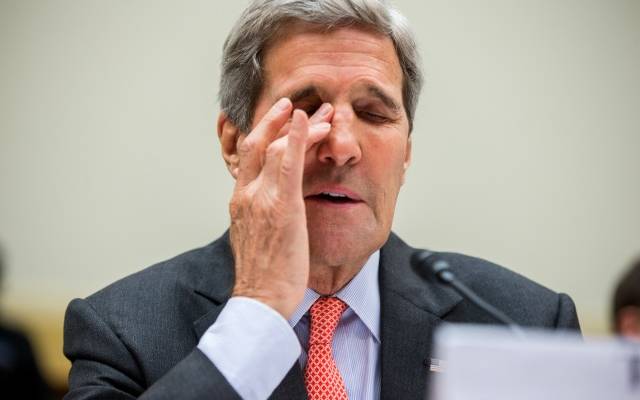
House Foreign Affairs Committee Chairman Rep. Ed Royce. (AP/Andrew Harnik)
Secretary of State John Kerry faced skeptical lawmakers as he attempted to defend the nuclear deal that he brokered with Iran. Congress is expected to vote on the deal in September.
Tension rose Tuesday during a packed hearing of the House Foreign Affairs Committee on the Iranian nuclear deal. Three of US President Barack Obama’s Cabinet members — Secretary of State John Kerry, Energy Secretary Ernest Moniz and Treasury Secretary Jacob Lew — fielded pointed questions from wary representatives.
Kerry faced skeptical lawmakers in a Congress hearing on the contentious nuclear deal with Iran and warned them not to nix it, insisting that it includes strict inspections and other safeguards to deter cheating by Tehran.
Congress has begun a 60-day review of the international agreement that is meant to curb Iran’s nuclear program in exchange for billions of dollars in relief from sanctions stifling its economy. All members can weigh the deal, as they keep in mind the words of Prime Minister Benjamin Netanyahu, who called it a “historic mistake.”
“Iran has cheated on every agreement they’ve signed,” said Congressman Ed Royce, the panel’s chairman, who asked if Tehran “has earned the right to be trusted,” given its history.
“Nothing in this deal is built on trust. Nothing,” Kerry responded.
Kerry was asked what would prevent Iran from adhering to the agreement for a short time, and then, in effect, take the money and run toward building an atomic bomb.
Kerry said that was not a likely scenario. He said the Iranian government is under pressure to improve the economy in their country where half the population is under 30 years of age and wants jobs. He also defended the inspection protocol under the agreement, arguing that if Iran tries to develop a nuclear weapon covertly, the international community will know.
“They can’t do that. Because the red flags that would go off — the bells and whistles that would start chiming — as a result of any movement away from what they have to do” to meet their obligations under the agreement, Kerry said.
Few, if any, new details emerged from the more than three-hour hearing. Some committee members asked the three officials questions, while others used their time to read lengthy statements in opposition. That left Kerry visibly frustrated, and several times he accused the members of misconstruing or misunderstanding the details of the agreement.
Faced with Republican majorities in both houses, the administration’s objective was to line up enough support for Obama among Democrats in what is all but certain to become a veto fight this fall.
Congress is expected to vote in September to prevent Obama from lifting sanctions imposed previously by lawmakers, a step that might cause Iran to walk away from the agreement. Obama has said he will veto any bill along those lines, and Republicans will need a two-thirds majority in both houses to override his objections.

Secretary of State John Kerry, Treasury Secretary Jacob Lew (R), and Energy Secretary Ernest Moniz. (AP/Andrew Harnik)
Apart from Royce, the panel’s senior Democrat expressed reservations about the plan. Representative Eliot Engel said he has “serious questions and concerns about this deal.”
Engel is a strong supporter of Israel, which vociferously opposes the agreement, as Iran has repeatedly said it wants to wipe out Israel.
As the hearing entered its third hour, Congressman Scott Perry told the trio that the deal would embolden Iran, which is already involved in activities that destabilize the region.
“Well, we’re going to give the crocodile, or the shark, a few more teeth and let’s just see if it does something different,” said Perry, who thinks the administration needs to negotiate a better deal. He asked Kerry whether he cared about what the American people, through their congressional representatives, thought about the agreement.
Kerry lashed back: “Congressman, I don’t need any lessons from you about who I represent. I’ve represented and fought for our country since I was out of college… Don’t give me any lessons about that, OK? Now, let me just make it crystal clear to you. This is America’s interest… Now, we believe that Iran was marching towards a weapon or the capacity to have a weapon, and we’ve rolled that back, Congressman.”
The hearing unfolded as the American Israel Public Affairs Committee (AIPAC), a pro-Israel lobby, dispatched hundreds of its members to prod lawmakers to disapprove of the deal.
On the other side of the issue, seven former US diplomats and State Department officials sent a letter Monday to leaders in Congress urging them to support the pact.
Kerry, Defense Secretary Ash Carter and Army General Martin Dempsey, chairman of the Joint Chiefs of Staff, are scheduled to testify on Wednesday before the Senate Armed Services Committee along with Moniz.
By: AP and United with Israel Staff

Sign the Petition to Stop a Nuclear Iran
The US Congress must ensure that sanctions against Iran remain in force until the nuclear threat is completely eliminated.
I strongly oppose easing sanctions before the nuclear threat from Iran has been eliminated. Allowing Iran to enrich uranium without being subject to 'anytime, anywhere' inspections is extremely dangerous and unacceptable. Iran's nuclear program must be stopped.
See our Privacy PolicyClick Here to Share the Petition with Your Friends
Click here to locate and contact your Senator.
Click here to locate and contact your Congressman.
